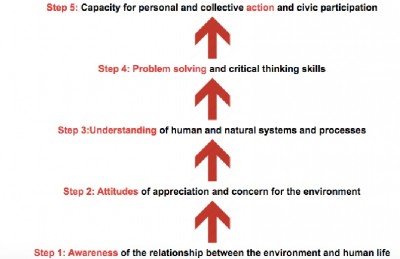Why Environmental Education?
What is it? |
Why does it matter? |
What does it look like? |
| The point of environmental education is for students to become environmentally literate. By this, we mean that students not only have content knowledge about the environment but rather the ability to act on that knowledge.
The Global Development Research Center defines EE as: “Environmental Education is a process in which individuals gain awareness of their environment and acquire knowledge, skills, values, experiences, and also the determination, which will enable them to act – individually and collectively – to solve present and future environmental problems”
|
Environmental education and literacy benefits both students and our world alike. “Tomorrow’s leaders need to be equipped for tomorrow’s challenges”Source: https://www.forestfoundation.org/why-teach-environmental-education-in-schools |
The goals of environmental education are defined by the Tbilisi Conference (1977): 1. to foster clear awareness of, and concern about, economic, social, political, and ecological interdependence in urban and rural areas; 2. to provide every person with opportunities to acquire the knowledge, values, attitudes, commitment, and skills needed to protect and improve the environment; 3. to create new patterns of behavior of individuals, groups, and society as a whole towards the environment.Source: http://www.gdrc.org/uem/ee/tbilisi.html |
Environmental Literacy Ladder

The Environmental Literacy Ladder outlines Steps 1-5: 1) Awareness of the relationship between the environment and human life; 2) Attitudes of appreciation and concern for the environment; 3) Understanding of human and natural systems and processes; 4) Problem-solving and critical-thinking skills; and 5) Capacity for personal and collective action and civic participation.
Click below for more information and resources
Stakeholders
Teachers
Site Authors:
Nicole DeFelice, Cristina Eberhart, James Follett, Nora Greene, Colin Ng, Brianna Petruccio, Gregory Simones